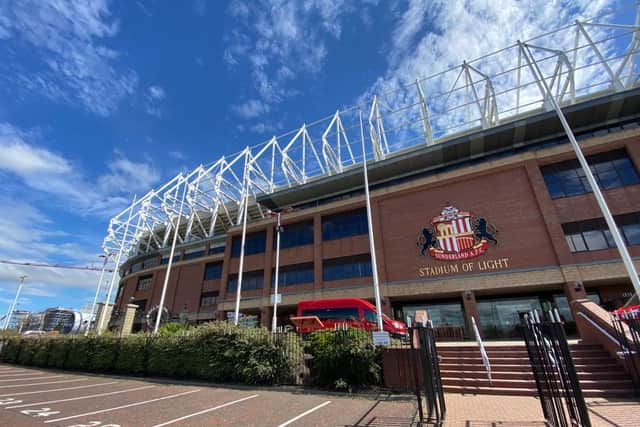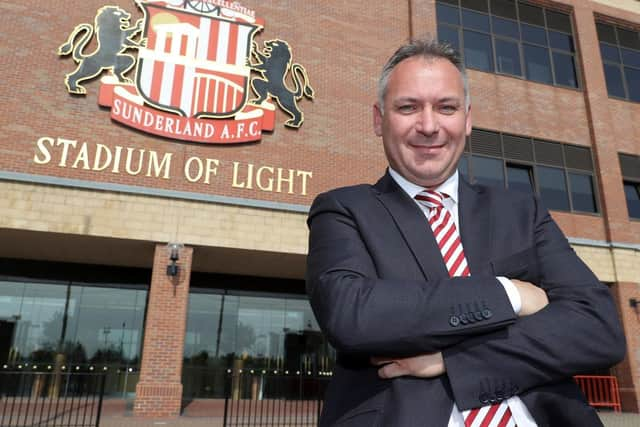Sunderland's Academy in Focus: Examining two years of poor results, staff concerns and a dramatic talent drain
and live on Freeview channel 276
One of the earliest and starkest indications of how football is going to change in the coming years came when long-serving boss Nigel Clough announced he would be standing down from his role at Burton Albion.
Clubs everywhere are adjusting to a new reality where revenues are shrinking and in his departing remarks, Clough stressed just how key academies are going to be in the new era.
Advertisement
Hide AdAdvertisement
Hide AdThis has been underlined by the transformative salary cap rules that seem to be inevitably heading for the EFL.
Wage bills and squad sizes are set to be capped, but academy players will be exempt.
For both raising revenue and competing on the pitch, clubs with strong academies could stand apart in the new normal.
All of which should serve Sunderland well in theory.
After all, during their introductory press conference back in the spring of 2018, Stewart Donald and Charlie Methven both stressed the importance of the club’s Category One academy.


Advertisement
Hide AdAdvertisement
Hide AdThey even referenced it as part of their desire to replicate the model that had proved so successful for Borussia Dortmund.
“If you’re really going to aim high, for a club with a massive, real working-class fanbase, then that’s the model,” Methven said.
“It’s accessible football, packing out the stadium, fantastic academy and when a player gets to a certain level, you can sell him and use the money to keep the project going.”
In the days previous, the mood around the club had been lifted by a thumping win over Wolves in front of the new owners, with a host of academy talent involved.


Advertisement
Hide AdAdvertisement
Hide AdTwo years on, the academy is a major source of concern for supporters.
In a recent Echo survey, over 90% of those polled said they felt the ownership was not committed to its long-term future, and the reasons for that are myriad.
Category One status has been retained (a not insignificant achievement given this had been in significant doubt during the previous audit), and there have been homegrown players playing a key part in the first-team squad.
Yet underneath that, the U18 and U23 sides have endured a wretched campaign, with just one league point between them.


Advertisement
Hide AdAdvertisement
Hide AdAt the heart of that has been a dramatic talent drain on Madrox’s watch, with a generation of talented youngsters moving to Premier League academies before signing professional terms.
It has led supporters to fear it is part of a concerted campaign to raise cash, and left academy staff fearing for the long-term future of an operation that is still bringing through countless high-quality players from the junior age groups.
So what exactly is going on, and what needs to change?
The Echo spoke to staff, players and figures in the game to delve deeper over a series of articles this week, starting with a focus on the two years of debilitating player departures….
A talented XI of departed talent
There is a very strong U23 side to be made of the players who have left Sunderland in the last two years, albeit one that might struggle defensively.


Advertisement
Hide AdAdvertisement
Hide AdThe sale of academy talent has, it is fair to say, been big business in the last two years.
Not one first-team player purchased in the Madrox regime has been sold for a profit, but those moving into the upper age groups have consistently brought in six-figure sums since their arrival.
A not exhaustive but instructive list of those who have gone:
Sam Greenwood (Arsenal)
Luca Stephenson (Liverpool)
Luke Hewitson (Liverpool)
James McConnell (Liverpool)
Morten Spencer (Leeds United)
Logan Pye (Manchester United)
Joe Hugill (Manchester United)
Cole Kiernan (Middlesbrough)
Bali Mumba (Norwich City)
Add Josh Maja, Joel Asoro and George Honeyman to that list, and we are talking of revenues raised well into the seven-figure category.
Advertisement
Hide AdAdvertisement
Hide AdSunderland have consistently stated that they are not actively selling players, and that they have been powerless in the process.
Yet staff have been left frustrated by the lack of cohesion and long-term thinking from above, and while each of those players have their own story and reasons for leaving, there has been a consistent theme of concerns from those The Echo has spoken to regarding their development were they to stay on Wearside.
Some have indicated that they felt the club did not do enough to keep them, leaving an impression that they were ultimately satisfied to raise revenue.
It is certainly the case that there has been a view in the Sunderland hierarchy that the departures should be seen in a more sympathetic light, as a process that could ultimately help the club get the first team back into the Championship.
Advertisement
Hide AdAdvertisement
Hide AdIt is a complex picture, but the prevailing view is that it is an area of the club where Sunderland have not been good enough under the current ownership.
Sunderland’s Unique Status: Category One, League One
The Black Cats, undoubtedly, are starting at a disadvantage.
They are, as Director Neil Fox recently told supporters at a ‘heated meeting’, in a unique position as they run a Category One Academy while the first team plays in League One.
The Echo spoke to multiple sources outside of the club who stressed that this makes it almost impossible for Sunderland to compete financially with the offers on the table from the big Premier League teams.
Advertisement
Hide AdAdvertisement
Hide AdAnother major issue for clubs vulnerable like Sunderland, external sources noted, is an utterly paltry compensation scheme that is badly in need of modernisation.
Even a Category One academy such as Sunderland is entitled to just £3,000 for every year a player has spent at the academy in the U9 to U11 groups, and £40,000 for every year thereafter up until the age of 16.
The consequence of this is that it makes business sense for top clubs to invest heavily and recruit talent in big numbers.
The maths are relatively simple. At those numbers, only one or two players need to come good to make the investment worthwhile.
Advertisement
Hide AdAdvertisement
Hide AdFor the clubs at risk of losing players when their scholarship deals end at those figures, it means it can make sense to do business, as negotiating a sale can potentially mean securing some extra funds or crucially, a sell-on clause that might not otherwise have been in place.
Nevertheless, the rules are simple.
Under the Elite Player Performance Plan, it is not allowed for clubs to approach players directly regarding a move while they are under contract.
So any player leaving Sunderland must do so with the club’s permission.
The Black Cats have stated that in practice it rarely happens this way, with former Academy Manager Paul Reid saying earlier this year he was ‘rarely the first’ to hear of other club’s interest.
Advertisement
Hide AdAdvertisement
Hide AdAt a recent meeting with supporter groups, CEO Jim Rodwell also added that ‘agents get rich moving players on and they are an influence in this situation’. This has been a regular statement from the club through the last two years and in fairness, there are many clubs through the pyramid who would share it to an extent.
Fans, though, are sceptical of this when the scale of departures at Sunderland has been so extreme.
It has also been the club’s view, perhaps fairly, that it is not realistic to prevent young players speaking to other clubs and exploring other opportunities, particularly when they will have no power to prevent it just months down the line.
Yet it begs the question: why are so many then taking that opportunity?
The star striker: The opportunity ‘too good’ to ignore and where Sunderland went wrong
Advertisement
Hide AdAdvertisement
Hide AdAs a 16-year-old scoring goals in a struggling U18 side (and subsequently, most eye-catchingly, in a struggling U23 side), Joe Hugill had interest from across the Premier League.
His departure perhaps encapsulates the all-too familiar process Sunderland have been going through.
Sunderland did attempt to keep Hugill amid the interest elsewhere, though they initially offered a year as a scholar before moving to professional terms.
While the Black Cats were never going to compete financially, a source close to the deal said that they felt the first offer made left the impression of a ‘tick-box exercise’, as in order to be entitled to compensation, a club must offer a deal on at least equivalent terms.
Advertisement
Hide AdAdvertisement
Hide AdWould it have prevented him moving to Manchester United, a club with a consistent and remarkable record of not just producing young players, but giving them opportunities?
In all likelihood, probably not.
Yet it underlined the sense that the Black Cats are not doing enough, and reflected the fact that many of these players attracting interest are often left to feel there is a more cohesive and convincing plan for their development elsewhere.
A family friend of the Hugill’s said: “It was a tough decision for Joe and his family, they are huge Sunderland supporters.
"The first offer was done in a bit of a cheap way - it felt like a bit of a tick-box exercise to protect the compensation.
Advertisement
Hide AdAdvertisement
Hide Ad"Sunderland could have done more, there's no doubt about it. The way Paul Reid went about it wasn't great.
"Ultimately, it probably wouldn't have made a difference. It wasn't about the finances, it was just too good an opportunity for a 16-year-old to turn down."
For the most part, players to have left were offered terms to stay, with the club setting down what they saw as the pathway for their development.
There have been some successes, too, with goalkeeper Adam Richardson signing a professional deal despite well-known interest from the likes of Manchester United.
Advertisement
Hide AdAdvertisement
Hide AdThe sheer volume of departures, however, suggest that the strategy isn’t strong enough and Hugill is a good example.
Sunderland may not have wanted him to leave, as they insisted at the time of his departure, and they may well have engaged with the intention of securing a deal.
Ultimately, though, the structures and teams in place were not enough to offer a convincing reason to do so.
One season, two teams, one point & a major problem
One of the major issues Sunderland face is the weakness of their U18 and U23 side.
Advertisement
Hide AdAdvertisement
Hide AdClearly, the first team’s decline has not helped in this and when it comes to budgets, the Black Cats are being blown out the water by other big Category One academies.
The issue is that the consistent sales of key players risk creating an immensely damaging cycle.
Players and parents fear that development will be badly affected by playing in a struggling side that is unable to compete.
In this brutal and unforgiving industry, one or two years of stagnation can be the difference between success and failure.
Advertisement
Hide AdAdvertisement
Hide AdA source close to one of the players who opted to leave cited that as a major reason behind their decision. They feared that if the teams were not strengthened, and performances or confidence dipped as a result, the interest from those big clubs that was there currently may dwindle.
In the ferociously competitive world of academy football, that could do major damage to a career even in its early stages.
So for every player that leaves, more then ponder how they can have a successful future moving through the U18 and U23 sides.
Sunderland’s coaching staff remain highly thought of by many parents and players, but the woeful results are having an impact.
Advertisement
Hide AdAdvertisement
Hide AdIt puts at risk the qualities for which the teams were once renowned, and which left players feeling coming through the Sunderland system was a major advantage in trying to make it in the wider game.
One former player neatly captured the issue, saying: "I remember at my old club when we were playing the U18 and U23s, they were one of the toughest teams to play against.
“When you were going up there on the long coach journey you were dreading playing them, and bringing back that sort of fear factor, resilience and being horrible to play against - if they can bring that back then they can compete in the academy leagues like they did before."
It has been a challenging time for players, some of whom have been left feeling that their progression is in danger as a result.
Advertisement
Hide AdAdvertisement
Hide AdAs the former player said: “It was very difficult. It hit different players at different times. We were in that hole of just losing and it's just so difficult to get out of."
Staff confusion and concern
The process has left academy staff frustrated and feeling that the club’s hierarchy have not done anywhere near enough to utilise the experience of staff in creating development plans that have a track record of success.
One source told The Echo that the current approach makes no sense.
For the long-term health of the academy, it is far more beneficial to invest at the age of 15/16 and grow the value of the player.
Advertisement
Hide AdAdvertisement
Hide AdIf the situation of the club means academy players have to be sold, then why not work together, with a cohesive plan so that when it happens, all parties benefit?
What’s happening now has little upside for the club, other than a short-term revenue boost.
Some of these players may not command a major fee in the future, but it only takes one to do so and the club has lost out significantly.
“It’s not healthy and disrespectful to the people in the building to suggest the club did everything to keep them, we could and should have a better outlook for the development of this branch of the club,” the source said.
Advertisement
Hide AdAdvertisement
Hide Ad“We shouldn’t be selling at 15/16 unless there’s a hidden agenda from the club as it’s more lucrative and is common sense to have a professional and connected plan.”
The sale of Asoro is perhaps an instructive one in this regard.
Some senior footballing staff noted that the £2 million sale of Asoro to Swansea City was up there with some of the best business they would do.
Not because he was a player without promise, which he undoubtedly is.
Advertisement
Hide AdAdvertisement
Hide AdHe impressed on occasions in the Championship and brings raw pace that is always valued and raises eyebrows in the game.
But he had one year left on his deal, had shown few signs of wanting to commit and after the early stages of pre-season, the assessment from staff was that he would not be as key in the following campaign as the likes of Lynden Gooch and Josh Maja.
So it was a decent fee at the right time, with his progress since then mixed.
It made sense, from both a footballing and business perspective.
Advertisement
Hide AdAdvertisement
Hide AdMany of these other sales in the subsequent period, not so much.
“The history of the academy and results of its player development should be reflected upon, as it’s the past models and staff input that have produced the players and reputation of the academy,” the source added.
“Communication into and from the academy to higher levels is non-existent. The academy isn’t valued or tapped in to at all.”
It is a combination of these concerns that have created the concern that the club’s hierarchy may not be committed to the long-term future of the academy.
Advertisement
Hide AdAdvertisement
Hide AdThey have steadfastly insisted that is not the case, but the persistent failure to prevent these departures will have long-term consequences.
For example, one player who recently left was surprised, to put it midly, when after a relatively encouraging campaign in difficult circumstances, they were offered a deal not on professional terms, but again as a scholar.
Given what was on offer elsewhere, and after a challenging time in a struggling side, there was no prospect of him opting to stay at that stage.
In that case, it’s hard to make any kind of case that Sunderland genuinely believed they would secure a new deal on those terms.
Familiar flaws in recruitment
Advertisement
Hide AdAdvertisement
Hide AdPart of the issue with the U18 and U23 sides has been that investment back into them has been minimal.
One issue The Echo discussed with multiple figures who have experience of Sunderland’s academy is that, yes, it can be difficult to prevent players taking big opportunities elsewhere.
Yet why not reinvest at least some of that money back into those sides?
Sunderland may be struggling, but it remains a Category One Academy.
Advertisement
Hide AdAdvertisement
Hide AdThis remains, or at least it should, a major draw for players in Category Two, Three and Four operations.
For players from those clubs, moving to Wearside means more coaching hours, better facilities, and an opportunity to play at a higher level and enjoy the platform that this games programme brings.
Recruitment into the academy, though, has been severely limited and almost entirely based on fielding an U23 side.
In this regard, there are obvious similarities with the wider structure of the football club, where there has not been a clear enough plan to handle the departure of key players.
Final thoughts
Advertisement
Hide AdAdvertisement
Hide AdAs recently as last week, Sunderland’s hierarchy insisted at a meeting with fan groups that the policy was not to ‘hawk young players to aid cash flow’.
Yet if there is a genuine will to retain talent, it is clear that there needs to be a major rethink and a greater utilisation of academy staff to convince players to stay.
As one source put it to The Echo, Sunderland understandably cannot compete financially right now.
So what is their USP to players?
A clear pathway to the first team? A comprehensive development plan?
Advertisement
Hide AdAdvertisement
Hide AdToo many feel it is not there, and that as such, the willingness to keep them at the club is not as strong as suggested.
Competing with the big clubs would be hard enough, even in ordinary circumstances.
The events of the last two years raise major questions around just how strong that commitment is.
In the next installment of our series, out later today, we take a closer look at Bali Mumba’s imminent departure with the academy product set to sign for Norwich City.
